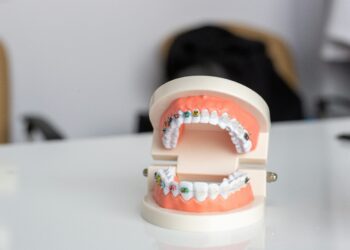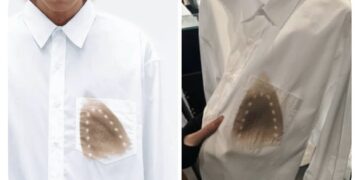Media personality Toke Makinwa, known for setting trends and sparking conversations, has done it again. She recently revealed her unexpected, and for many Nigerians, controversial, approach to newborn care: she doesn’t bathe her baby every single day.
Makinwa argued that frequent bathing is unnecessary and potentially damaging, stressing that infants are not “dirty.” This statement hits a nerve in Nigerian culture, where the scent of a clean baby is prized, and daily bathing—often twice daily—is a non-negotiable standard of hygiene passed down through generations. But is Toke Makinwa simply being unconventional, or is she pointing us toward a scientifically superior beauty routine?

The Dermatological Defence
From a strictly dermatological standpoint, Toke Makinwa’s choice is scientifically sound. The argument rests entirely on the skin barrier, the baby’s first line of defence.
- Protecting the Vernix: Newborns emerge covered in the vernix caseosa—a thick, waxy, and powerful protective layer. This natural barrier is rich in lipids, proteins, and anti-infective properties. Excessive washing, especially in the first few weeks, strips this superior natural shield away prematurely.
- The Lipid Compromise: Skin, infant or adult, is protected by a thin layer of natural oils (lipids). Soap and hot water are designed to emulsify and break down oil. Daily use of these strips the natural moisture barrier, potentially leading to:
- Dryness and Flakiness: The most common immediate effect.
- Irritation and Eczema: A compromised barrier increases the risk of developing sensitive skin conditions like atopic dermatitis (eczema).
Current international pediatric guidelines often recommend just three baths a week for newborns, emphasizing the “less-is-more” philosophy to let the skin’s natural defence system mature.
The Case for the Culture: Hygiene and Tradition
In Nigeria, the daily bath is rooted in a compelling blend of practicality, climate, and cultural standards that cannot be dismissed as mere habit.
- The Heat and Humidity: Given the warm, humid climate across Nigeria, sweating and accumulated grime are major factors. Daily bathing is seen as essential for comfort, preventing heat rash, and maintaining basic hygiene, especially in the skin folds where moisture collects.
- The Standard of Cleanliness: The frequent bath is deeply connected to a powerful cultural mandate for cleanliness. The idea of deliberately skipping a bath, even for a baby, can feel like a direct violation of a good parenting standard. Many believe the risk of heat rash or bacterial build-up from environmental factors outweighs the theoretical risk to the skin barrier.
- The “Top and Tail” Debate: While experts suggest spot-cleaning (“top and tailing” the face, hands, and nappy area) on non-bath days, many Nigerian parents find this insufficient, preferring the thorough wash that only a full bath can provide.
The Bottom Line?
So, does Toke Makinwa’s bold declaration mean you should immediately stop bathing your baby every day?
The answer is a beautiful compromise.
- If you side with the science, try scaling back. Consider bathing the baby every other day (three to four times a week) in the first six months. On off-days, focus on thorough spot-wiping. Always use short bath times (5-10 minutes) and fragrance-free, pH-neutral, soap-free cleansers.
- If you side with the culture, maintain your routine but be strategic. Avoid very hot water, keep the bath brief, and immediately lock in moisture with a rich, unscented infant emollient or natural oil (like shea butter) after patting the skin dry. This helps replenish the lipids stripped away by the water and soap.
Toke Makinwa has thrown a grenade into a sacred ritual, forcing us to ask: Is “clean” defined by soap, or by a healthy, protected skin barrier? The ultimate choice rests with the parent, weighing scientific fact against cultural comfort.


















